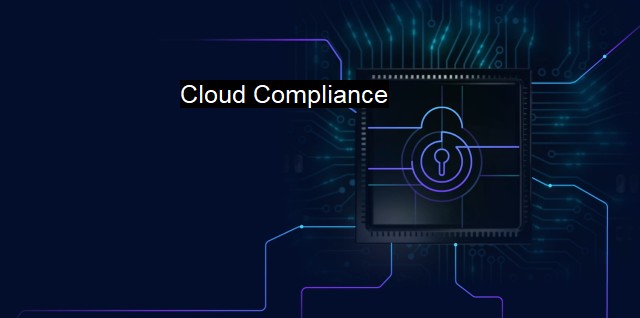What is Cloud Compliance?
Securing the Cloud: The Importance of Cloud Compliance, Cybersecurity, and Antivirus in Modern Businesses
Cloud compliance refers to a critical aspect of information technology (IT) that revolves around the set of principles, policies, and regulations ensuring that data stored in the cloud is effectively secured, protected, and properly managed. As businesses and organizations increasingly transition operations to the cloud environment, the focus on cloud compliance sharpens.The landscape of cloud computing has modernized industries by offering flexibility, cost-effectiveness, and geographical independence. along with its advantages come cybersecurity risks. These risks involve breach of privacy, loss of sensitive data, unauthorized data access, loss of data control, and compliance violations resulting in hefty penalties. Thus, ensuring cloud compliance becomes imperative to protect against these potential cyber threats.
At the core of cloud compliance lies the primary objective of safeguarding the stored and transmitted data while abiding by the specific industry's legally required standards and regulations. It covers a range of activities, including data encryption; robust design, implementation, and management of security controls; regular auditing of the IT infrastructure and reviewing the security strategy.
Cloud compliance involves crucial measures like authentication and identification procedures, network and application firewalls, malware detection routines, data loss prevention techniques, and secure coding practices. Cloud service providers need to offer these measures to reinforce data privacy and integrity, prevent unauthorized data access, and guard against malicious cyber threats.
While ensuring cloud compliance, businesses need to understand that the responsibility is shared between them and their cloud service provider. Cloud customers need to identify sensitive data, categorize it accordingly, use proper encryption for data-at-rest and data-in-transit, implement strong access control protocols, track abnormal user activities, and ensure secure data disposal. Simultaneously, cloud providers must offer advanced tools for data protection, regular vulnerability assessment and penetration testing, incident response, and a robust policy for physical system security.
Notably, cloud compliance goes beyond security measures. It majorly delves into legal obligations as well. Different nations and regions hold separate privacy regulations, such as the General Data Protection Regulation (GDPR) in the European Union and the California Consumer Privacy Act (CCPA) in the USA. Therefore, businesses also need to decide where their cloud service providers house the actual servers storing their data.
Various industries such as healthcare, finance, and e-commerce have stringent compliance standards, including the Health Insurance Portability and Accountability Act (HIPAA), the Payment Card Industry Data Security Standard (PCI DSS), and the Sarbanes–Oxley Act (SOX). These standards set strict guidelines on how to handle sensitive data. In adhering to these laws, cloud providers prove essential, assisting businesses to meet these regulations without encountering inconsistencies or violations.
In this light, businesses must diligently scrutinize their prospective vendors concerning their compliance strategies. A vendor's documentary proof of continuous compliance monitoring, their audit logs, third-party verification of their compliance status, and their history of data breaches, if any, should form key factors in the decision-making process.
Choosing right vendors who emphasize data protection privacy laws, cyber security measures and proactively update themselves with the gradually changing data privacy norms should remain at the forefront of any organization’s strategy.
Cloud compliance in the realm of cybersecurity and antivirus is a complex process, dependent on technological innovation, strategic planning, legislative evolution, and adoption of best industrial practices. Therefore, any entity that relies heavily on cloud computing needs to constantly updates its data management policies and operating procedures to ensure compliance, protect sensitive information, prevent malicious attacks, and avoid potential legal actions.

Cloud Compliance FAQs
What does cloud compliance mean?
Cloud compliance refers to adhering to the regulatory requirements and security standards for storing and processing data in the cloud. It involves implementing measures to protect data integrity, confidentiality, and availability while using cloud services.Why is cloud compliance important for cybersecurity?
Cloud compliance is crucial for cybersecurity because it helps to ensure that sensitive data stored and processed in the cloud is adequately protected against cyber threats. Cloud compliance standards provide a framework for companies to implement security controls that mitigate the risk of data breaches, malware attacks, and other cyber threats.How can companies ensure cloud compliance?
Companies can ensure cloud compliance by selecting cloud service providers that are compliant with industry standards such as SOC2, ISO 27001, and HIPAA. Additionally, companies can review their internal security policies and procedures to ensure they align with cloud compliance standards and implement the necessary security controls. Regular audits and assessments should also be conducted to ensure ongoing compliance.What are the benefits of cloud compliance?
The benefits of cloud compliance include increased data security, reduced risk of data breaches, and improved regulatory compliance. It also helps to build customer trust and can lead to increased business opportunities with clients that require compliance with specific industry standards. Overall, cloud compliance ensures that companies are following best practices for storing and processing sensitive data in the cloud.| | A | | | B | | | C | | | D | | | E | | | F | | | G | | | H | | | I | | | J | | | K | | | L | | | M | |
| | N | | | O | | | P | | | Q | | | R | | | S | | | T | | | U | | | V | | | W | | | X | | | Y | | | Z | |
| | 1 | | | 2 | | | 3 | | | 4 | | | 7 | | | 8 | | |||||||